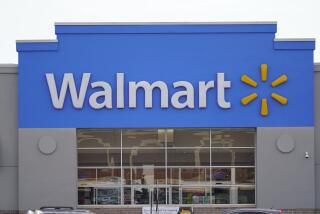There’s No Strut in Sears’ Repair Settlement
Consumers who purchased new struts at Sears, Roebuck & Co. are wondering why they were left out of the auto repair fraud settlement reached this summer with the state Department of Consumer Affairs.
In the undercover investigation that led to the fraud charges, the California Bureau of Automotive Repair alleged that its agents were sold unneeded struts, a suspension component that is similar to a shock absorber. While shocks are part of the settlement, struts are not.
Allen Wood, chief investigator on the Sears case, said he was puzzled by the omission of struts, commonly used in most European and newer American cars. Wood said that when the settlement was announced, the absence of struts “was the first thing I noticed.”
Deputy Atty. Gen. Herschel D. Elkins said struts were left out of the agreement because evidence of overcharging on struts was inconclusive. He said evidence of overcharging was stronger when it came to shocks and four other parts: idler arms, coil springs, brake calipers and master cylinders. Anyone who had any of those five parts replaced between Aug. 1, 1990, and Jan. 31, 1992, is entitled to $50 in merchandise coupons from Sears.
According to spokeswoman Kate McGuire, the Bureau of Automotive Repair has received a “significant number of complaints” from strut purchasers. She said any dissatisfied Sears customers are entitled to their money back under the retailer’s “satisfaction guaranteed” policy.
Milking profits: What a difference 50 miles makes, at least when it comes to milk prices. Informed sources in the grocery industry say average whole milk prices in the Los Angeles area are 18% higher than in the Inland Empire.
According to these sources, the average price of whole milk at supermarkets in the Inland Empire was $2.32 a gallon in November, compared to $2.73 in the Los Angeles area. On a store level, the difference is eye-popping. Lucky, “the low price leader,” charges $2.29 in the Inland Empire and $2.73 in Los Angeles. Prices at Albertsons, which boasts “rock-bottom prices,” are the same as Lucky in both areas.
It’s hard to understand the price differences, because in most cases, the milk is shipped from the same processing plant. Albertsons didn’t respond to a request for comment.
Lucky spokeswoman Judy Decker put it this way: “With any product, our prices are determined by competition in the immediate area.”
Or lack of competition. The Times recently reported that a Department of Food and Agriculture survey showed that average whole milk prices in the Los Angeles area were 20% higher than in the San Francisco and Sacramento areas. The department’s explanation: a lack of competition among Los Angeles supermarkets for milk sales.
Getting the fat out: Low-fat milk prices have also been high, but there were indications Thursday that the competitive picture may be changing. Alpha Beta on Thursday put 2% low-fat milk on sale for $1.98 a gallon, a 20% price cut. Sources in law enforcement and in the dairy industry say they couldn’t remember the last time one of the major grocery chains put milk on sale.
‘Tis the scam season: The holidays are approaching, and the con artists are too. The Better Business Bureau of the Southland is warning consumers to watch out for phony charities stationed at supermarkets and shopping malls, said to be collecting funds for the homeless or needy.
Lona Luckett, director of operations at the bureau, said con artists know people are more likely to give during the holidays, and take advantage of that. Consumers should check to see if the charity is licensed to solicit funds before making contributions, Luckett said.
Luckett also warned consumers to be wary of door-to-door pitchmen selling gift items, such as watches, appliances or toys. Not every community licenses door-to-door sales, so it is harder to check on them. “If the company is based out-of-state, or it’s a name you never heard of, I would hesitate,” she said.






